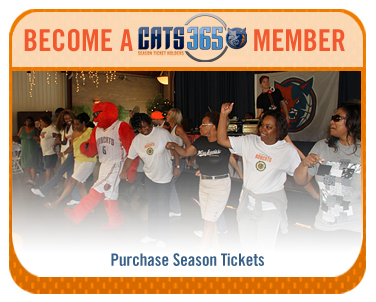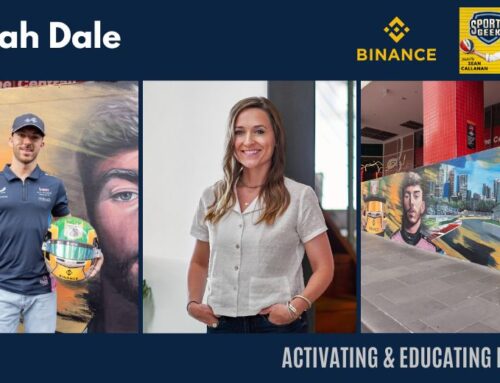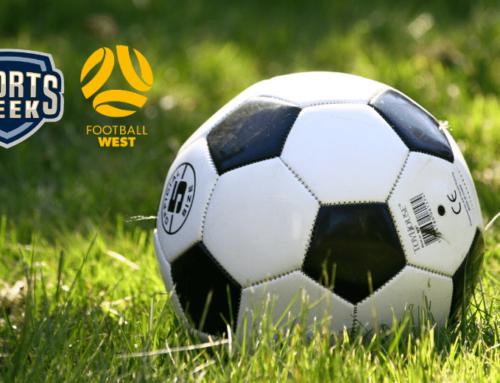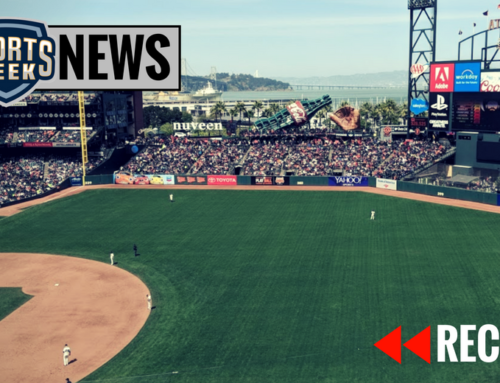This week on ABC Grandstand, Sean was in the studio to discuss Sports CRM after it was a big discussion point at SEAT Conference.
Sports CRM

CRM (Customer Relationship Management) is a vital & growing area in sports industry. We discussed how sports are using CRM with Chris Zeppenfeld from the Charlotte Bobcats with 18,000 seat stadium and a season ticket base of 7,000 there is a lot of tickets to sell over an 82 game NBA season. Using CRM teams like the Bobcats can get a 360 degree view of the customer/fan to determine how to best sell & satisfy the fan's needs. CRM can be used to serve several purposes in sports business – season ticket/membership sales, sponsorship sales & merchandise & food beverage sales analysis and more.
As Chris said in the interview the more informed teams are about their fan base the more customised (AKA cool stuff) teams can be in their approach to fans. The Bobcats offer season ticket holders extra benefits though their Cats 365 program providing events & promotions to the Bobcats fan base all year round.
Until next week
Catch it live on Saturday mornings (at 7:40am) when Sean Callanan discuss sports digital with Francis Leach on ABC Grandstand. Tune into ABC Grandstand Breakfast Friday through Monday on ABC Grandstand digital radio.
Subscribe to or Sports Geek Podcast in iTunes.
Your thoughts?
How does your team connect with you?
Are you happy with the email & direct mail you are getting from your team?
When did your sports team call you directly?
Let us know in the comments.
Transcript
FRANCIS: And Sean Callanan and our digital sports Guru’s with us here each Saturday morning, good day Sean, how you going?
SEAN: I’m good thanks Francis.
FRANCIS: It’s been a fascinating week watching the US Open, the Paralympics, and everything else, finding it hard to keep up with everything.
SEAN: Yeah, yeah it is. A friend of mine actually is over there checking out, fulfilling her bucket list of 3 of 4, she’s now at 3 of 4 of the Grand Slams, so she’s over there enjoying the US Open.
FRANCIS: Good day to be there Stosur winning as well, won the last 14 US Open matches extraordinary record for Sam Stosur. Ah buying tickets to big events not easy, and I reckon also for the increasing competition in the space for sports organisations to sell tickets is not easy either, because you’ve got to identify your target market, and you’ve got make it attractive to them because there are so many options now for sports fans.
SEAN: Ah definitely, you know, and at SEAT in Boston they added a stream for CRM, for people who don’t know CRM its Customer Relationship Management systems and the way that sports teams over there are using them to better identify sales targets, both from a ticketing point of view for season tickets, but also from a sponsorship point of view, so some really sophisticated stuff happening there in – in being able to identify, you know, look at a database, identify the fans, but then actually call them. So there’s a real big emphasis on ticket sellers and ticket reps and effectively sales reps, so it’s not telemarketing it’s about building that relationship which we’ve talked about from a social media point of view, but having that personal touch of calling you up and saying – asking what you’re looking for, what you want in a season ticket, what other amenities.
FRANCIS: It’s fascinating because I was at home, it was my dad’s 70th yesterday, happy birthday dad, and my brothers and sisters all got together and we’re all footy fans, barrack for different clubs, part of my family is St Kilda, part of its Essendon, so we’re actually sitting there going how much do you pay for your silver membership at the Essendon Football Club and what do you get for it, and how much are we paying for ours, and someone over there was an AFL member and well maybe that’s a better option, so there were three or four different sort of, we were literally doing a – it was like a little in-house survey group working out oh I think I’m being ripped here. So it was really interesting the disparity there, but also the curiosity people had about what value they were getting for their spend, for their entertainment or sports experience.
SEAN: Well that’s the thing, and now that all the clubs are now looking forward to diversify their offerings. I think Collingwood were the first to do it to start offering that three game membership. They looked at their database and this is what you know CRM is all about, they looked at their database and they saw a need and they saw that there were fans who wanted to come to the games but couldn’t – couldn’t come to all the games and so they defined a package, which was, now we know is a three game package, and that that did help expand their membership, they’re not all you know full season members, but it gets them on the- it gets them in the database, it gets them as a paying customer and you know – – –
FRANCIS: And you can start building a relationship with them.
SEAN: Start building a relationship with them and a person who’s a three game membership might become a, you know, might become an 11 gamer next year and might become an 18 gamer and those kind of things, so it’s about up scaling that fan.
FRANCIS: Who was ahead of the curve in the States who you met there at the SEAT conference who was doing this better than others?
SEAN: Yeah so one of the guys that I did meet was Chris Zeppenfeld, from the Charlotte Bobcats, so the Charlotte Bobcats are in the NBA, and they’re not doing the best on field, but from a sophistication of their sales team and using CRM, they’re doing a really great job to sell out their stadium and sell a whole bunch of tickets.
FRANCIS: Well he’s with us this morning here on Grandstand Breakfast here in Australia. Good Day Chris how you are you?
CHRIS: I’m doing well how is everybody over there?
FRANCIS: Not too bad. We’re a lot happier now that Lleyton Hewitt’s won his match there in New York, so that’s put a smile on everyone’s faces here in Australia this morning. Firstly, I mean how hard is it when your team’s not going well, like the Bobcats have had maybe a tough time of it in the last couple of seasons, to actually continue to get people through the gates and give them an experience they’ll actually enjoy and pay money for?
CHRIS: You know I think the biggest thing that we try to do you know with our fans is you know is kind of describe them as a little bit more than just kind of what’s going on, on the court. It’s the experience of you know taking out your son or your daughter to a game, you know taking out you know your best business client or vendor or prospect, and giving them the best experience that they can have for a night out. You know it’s a little bit more than just what you see on the court. And I think that’s the really key thing that we try to push here, you know, and eventually you know as the team gets better then you can start highlighting the different things that are going on court.
FRANCIS: And Chris we discussed yesterday the differences and the developments in that – in the sports CRM space and how the different teams are really attacking the space and treating sports as a business. Who are some of the teams that are doing a really good job in the space of sales and using sports CRM to really maximise what they can bring to the table?
CHRIS: Yeah and I think there’s kind of two groups of teams that are doing this well. I think you’ve got one group that is you know maybe doesn’t have to sell as many tickets but utilising CRM to kind of get this 360 view of a customer and maximise the potential revenue that they can get, and I think teams like the Dallas Cowboys. The Boston Celtics do this very well. You know those guys I think really have thought about you know not just ticket sales but looking at you know merchandise and online food and beverage and website traffic and those types of things, so they really understand what their customers are doing, not just you know when they go to the game but just outside and how they interact with their product outside of the stadium. You know I think some of the teams that are a little bit more kind of ticket sales focussed or sponsorship focused would be the Philadelphia 76ers, I think Mark Gullett does a tremendous job down there. I was really impressed with some of the stuff that they’re doing, you know and that’s even, New Orleans Hornets and the Toronto Raptors and Maple Leafs, and that group does a really good job, those are some of the pioneers in the NBA of really coming out with you know a CRM solution for the team.
FRANCIS: What about for your franchise there Chris, what are some of the things that you’ve learnt from your fans in the last two or three years with services that they expected you to deliver to enhance their game day or their experience with the Bobcats?
CHRIS: I think the biggest change that we had over the last three years, is really understanding that you know we have a sales staff of 40 people you know who make you know a number of out bound calls per day, as you can imagine at the Bobcats, we don’t have a tonne of people just ringing in on the phones to you know clambering for Bobcats tickets, probably like other teams do. So we’re very aggressive at going out to the public and having to make outbound sales, and I think the biggest thing we’ve done is really make sure that we are maximising those reps’ efforts. You know I think in the past, you know, they might just take a list of single game buyers and you know just kind of randomly distribute those out and now it’s a far greater science to that, CRM’s a big piece of that, that kind of helps determine you know who’s going to get a phone call from us, you know is it because you know they’ve clicked on our website or from our lead scoring program do they score well, you now have they done something with their email behaviour so they opened or clicked one of our emails, what did they click on their email, you know those types of things factor in as to whether or not you know we’re going to have one of our trained sales reps calling them.
FRANCIS: So you must have like their electronic DNA to be able to track what will you know flick their switch in a way?
CHRIS: I’m sorry.
FRANCIS: So you’ve almost got an electronic DNA of the customer or the fan, so you know what’s going to be thing, the hot button to press that will get them interested.
CHRIS: Yeah and I think that’s kind of what you know always our goal as you know CRM Managers here is to kind of create this 360 view of the customer. So you know for most of the teams that have a CRM you know they have a pretty good idea of what they’re ticketing behaviour is because a lot of us use Ticket Master Autotiks, and that data feeds into our CRM, and for those who are maybe unfamiliar with Ticket Master Autoticks, it’s you know if you were to go and purchase a ticket you know at bobcat.com, and you wanted to go to a game you’d be using that Ticket Master system, so we’re able to collect you know the – of course the address, the phone and the email and of course what did you buy. So every team kind of has that but now it’s a little bit more sophisticated of things such as you know what kind of emails do you respond too, you know what kind of surveys have you responded to, and that information you know we’re collecting it, and that’s really what CRM brings to the table. There’s so much information that you know the fans are willing to give you, you know, who’s their favourite player, or you know I like to buy nachos, you know, in the second quarter, or you know I like to buy this jersey around Christmas, you know all those types of things it’s hard to collect that data, you know kind of organise it in some way and actually assimilate something from it. And that’s really where CRM really, really helps.
FRANCIS: Yeah we did actually talk about that with the display signage stuff where the technologies getting there. Where you walk into the stadium and you scan your season ticket and your favourite player might be welcoming you to the arena and that’s the kind of stuff that CRM can offer us isn’t it?
CHRIS: Absolutely. And again I think it’s you know we’re – you know I kind of likening the three areas, you know you’ve got to be able collect the data, you’ve got to be able analyse that data and to be able to do something from it. And I think really where you know it really, really helps is that collecting piece. There is just so much out there to collect, how do you organise this you know in some organised fashion that somebody else can act on.
FRANCIS: It’s like a little piece of – of metal that you need to alchemise into gold. Good on you Chris, thanks for giving us an insight and good luck with the Bobcat season ahead and with the National Democratic Convention that’s in your backyard over the next few days, it must be busy there.
CHRIS: Oh it’s unbelievable and we’re really excited here. Thanks again for having me on.
FRANCIS: Chris Zeppenfeld there from the Charlotte Bobcats, talking to us about how they’re doing their best in the Customer Relations Management and how technology is allowing them now to know a lot about you and know what really works for you. So we’ll see that start to really become sophisticated in Australia as well.
SEAN: Definitely will. We’ll start seeing a lot more of it as teams want to really maximise the value of the fan.
FRANCIS: It’s all about the fan, without us they’ve got nothing.
SEAN: Exactly. Exactly.
FRANCIS: Good on you Sean. How can we find you online and in the digital world again?
SEAN: sportsgeekhq.com or Sean Callanan or @SportsGeek on Twitter.
FRANCIS: You can’t miss him, Sean Callanan with us each Saturday morning here looking at digital sports, its Francis Leach with you on Grandstand Breakfast.




